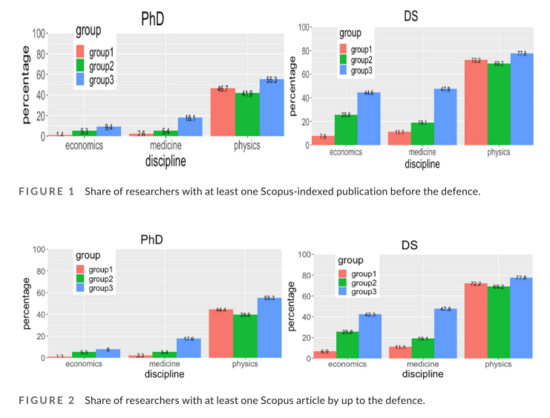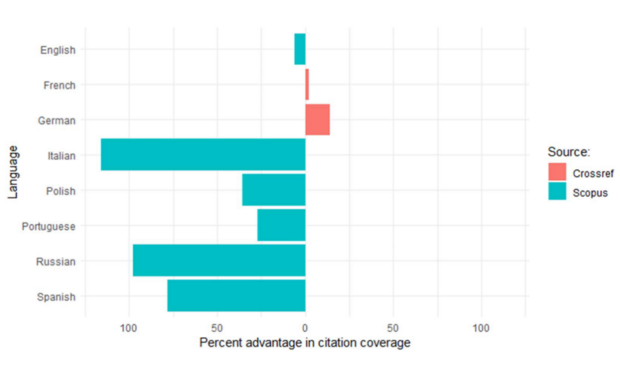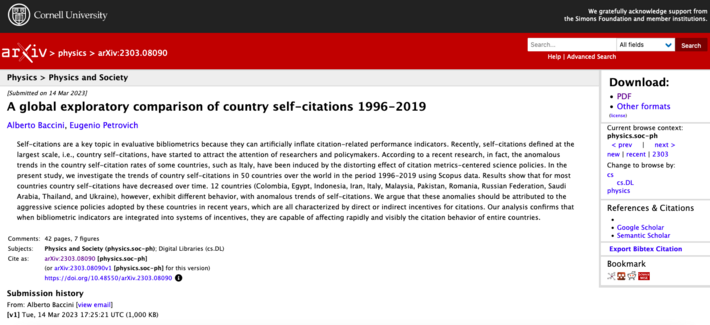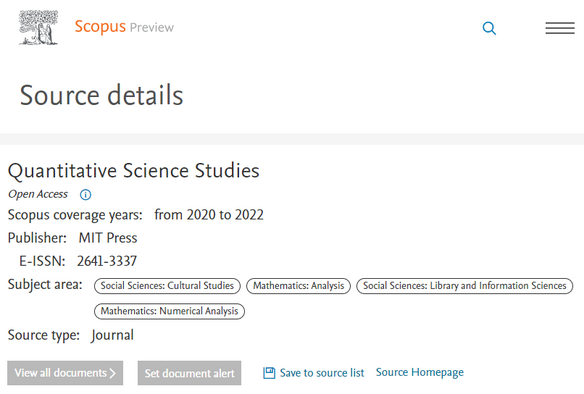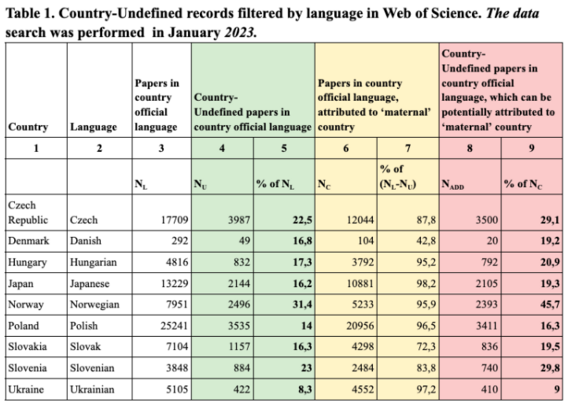Serhii Nazarovets · @serhii
375 followers · 135 posts · Server mstdn.scienceThis article aims to explore the effects of doctoral publication requirements on the research output of Ukrainian academics in #Scopus in terms of quantity and impact. In short, changes in doctoral publication requirements did not result in doctoral holders publishing in more impactful journals:
Serhii Nazarovets · @serhii
375 followers · 134 posts · Server mstdn.science"Rather than prioritizing the best platform to disseminate their results, the main priority seems to have shifted towards the formal status of journals, such as indexing in #Scopus, which does not necessarily imply influence or global visibility by default":
#scopus #bibliometric #humanities #ukraine #language
Nathaniel D. Porter · @ndporter
575 followers · 418 posts · Server sciences.socialSerhii Nazarovets · @serhii
364 followers · 120 posts · Server mstdn.scienceFascinating publication in @QSS_ISSI:
:doi: Crossref as a bibliographic discovery tool in the arts and #humanities https://doi.org/10.1162/qss_a_00240
The authors compared the number of citations received by articles according to #Scopus and #Crossref. For English outputs, Scopus presented a minor advantage (+6%) over Crossref more #citations. Crossref retrieved more citations than Scopus for documents in 🇩🇪 (+14%) and 🇫🇷 (+2%), whereas Scopus retrieved more citations for the remaining languages.
#humanities #scopus #CrossRef #citations
EASE · @EASE
74 followers · 107 posts · Server mstdn.scienceTracy Chen explains the Scopus evaluation process, which includes assessing journal applicants against the COPE/WAME/DOAJ/OASPA Principles of Transparency and Best Practice in Scholarly Publishing: https://doi.org/10.24318/cope.2019.1.12
EASE · @EASE
74 followers · 100 posts · Server mstdn.scienceRT @pippasmart on 🐦
Tayfun Basal from Elsevier
Reporting over 43,000 journals in SCOPUS of which c.27,000 are still live. Lots of detail about selection criteria - key is academic contribution to the field #EASEevents #Scopus
François Renaville 🇺🇦🇪🇺 · @fr
257 followers · 415 posts · Server mastodon.top#Publishing international #library and information science #journals: The changing landscape
https://doi.org/10.1177/09610006221090958
#LIS #informationscience #SJR #Scopus #WoS #Diversity #DEI
1/3
#publishing #library #journals #lis #InformationScience #SJR #scopus #wos #diversity #dei
Alex Afouxenidis · @afouxenidis
1050 followers · 29 posts · Server mastodon.worldThings maybe (slowly) changing in the academic publishing world, I hope
In view of the news posted below a quick reminder [and since I'm 'chief editor', I do the promo here 🙂] this journal is completely free to publish with no APCs or any other costs and is #Scopus listed (check it out: https://ejournals.epublishing.ekt.gr/index.php/ekke)
----
‘Too greedy’: mass walkout at global science journal over ‘unethical’ fees
---
https://www.theguardian.com/science/2023/may/07/too-greedy-mass-walkout-at-global-science-journal-over-unethical-fees?utm_term=Autofeed&CMP=twt_gu&utm_medium&utm_source=Twitter#Echobox=1683444322
Jan B. Vornhagen · @VornhagenJB
106 followers · 265 posts · Server hci.socialQuestion for the #AcademicMastodon / #LiteratureReview crowd: Are there any databases like #Scopus or #WebOfScience I could use for a (multi-disciplinary) systematic literature review that are not owned by the absolute worst kind of companies? Preferably with free access as well.
#academicmastodon #literaturereview #scopus #WebofScience
Kostas Kormas · @kkormas
121 followers · 182 posts · Server mstdn.science@clementaubert good idea but all I have is just a name e.g. "John Smith", in #SCOPUS for example you get 910 authors with this name ... of course the search can be more specific but it still gives me a lot of authors ... I guess I have to skip this reviewer ... whoever they are ... I hope some of you, computer people, will do something about it ... at some point.
François Renaville 🇺🇦🇪🇺 · @fr
242 followers · 342 posts · Server mastodon.topCurrent Status of Open Access Journals in India: A Bird's Eye View
👉 "The yearly growth of #openaccess journals in India was found to be 22.36%. Among these 306 #OA journals, about 44.11% of #journals are indexed in #Scopus, 34.96% of journals are indexed in #WebofScience(#WoS), and 7.18% of journals with impact factor (#IF) are indexed in #JCR. Almost 74% of open access journals published in #India do not charge Article Processing Charges (#APC)."
https://www.tandfonline.com/doi/full/10.1080/0361526X.2023.2183926
#openaccess #oa #journals #scopus #webofscience #wos #if #jcr #india #apc #publishing
Serhii Nazarovets · @serhii
301 followers · 76 posts · Server mstdn.scienceIn the new #preprint, the researchers investigated self-citation trends in 50 countries in the period 1996-2019 (#Scopus data). The results show that for most countries, self-citation has decreased over time, but 12 countries (including my own #Ukraine 😥 ) show different behaviour, with anomalous self-citation trends:
📄 https://arxiv.org/abs/2303.08090
"These anomalies should be explained by the aggressive research policies adopted... characterised by direct or indirect #citation incentives" 👏
#preprint #scopus #ukraine #citation
Bayes Plurinacional · @BayesDelSur
4 followers · 9 posts · Server bayes.club✅ Ya se encuentran disponibles en nuestro sitio web las Redes de Coautorías Bayesianas de Latinoamérica (fuente #scopus Realizado por Gustavo Landfried y Ariel Salgado. 🙌
#scopus #congreso #bayesiano #plurinacional
Paco Martínez · @pacobib
155 followers · 248 posts · Server mastodon.cloudRT @amdelvaz
Ojo al de dato los amantes del #JournalImpactFactor y los cuartiles. La #WoS será la nueva #Scopus, me explico:
#journalimpactfactor #wos #scopus
Ludo Waltman · @LudoWaltman
668 followers · 297 posts · Server social.cwts.nlSubject area classification of @QSS_ISSI in #Scopus doesn't make much sense. Three of the four subject areas are incorrect! https://www.scopus.com/sourceid/21101062805
In 2015/2016 I published a paper about inaccuracies in the Scopus subject area classification https://doi.org/10.1016/j.joi.2016.02.003 https://doi.org/10.48550/arXiv.1511.00735. Unfortunately it seems the problem still hasn't been fixed.
petersuber · @petersuber
3606 followers · 586 posts · Server fediscience.org@csmarcum
I don't know how well #Dimensions covers African journals specifically. But it's much more comprehensive overall than #Scopus or #WOS.
https://fediscience.org/@petersuber/109513747735792962
petersuber · @petersuber
3606 followers · 582 posts · Server fediscience.orgUpdate. #SCOPUS and #WOS are very incomplete at indexing #African journals.
https://www.universityworldnews.com/post.php?story=20230213021356132
"Only 4% of Nigeria’s 294 biomedical journals are indexed in the major indexes, according to the book. 'There is also little overlap between the African journals hosted on #AJOL (African Journals Online) and those indexed in Scopus,' the authors add."
Serhii Nazarovets · @serhii
301 followers · 76 posts · Server mstdn.scienceIn this research letter 📮 , we draw the attention of the #scientometrics community to the fact that numerous records of non-English publications in the #Scopus and #WoS do not include information about the country of the authors:
:doi: https://doi.org/10.1007/s11192-023-04661-1
These limitations of #citation databases must be taken into account when conducting #bibliometric analysis, especially when comparing the outputs in #SSH at the level of countries.
#scientometrics #scopus #wos #citation #bibliometric #SSH #language #country #affiliation
petersuber · @petersuber
3589 followers · 557 posts · Server fediscience.orgUpdate. #SCOPUS and #WOS are also very incomplete at indexing #preprints. See this new study comparing them to #Dimensions, #Lens, and #EuropePMC.
https://upstream.force11.org/the-preprint-revolution-implications-for-bibliographic-databases/
#europepmc #lens #dimensions #preprints #wos #scopus
Ludo Waltman · @LudoWaltman
655 followers · 262 posts · Server social.cwts.nlThe preprint revolution - Implications for bibliographic databases https://upstream.force11.org/the-preprint-revolution-implications-for-bibliographic-databases/
Bibliographic databases are increasingly recognizing importance of preprints. How do they index preprints?
@neesjanvaneck and I offer 6 recommendations for preprint indexing. We show to what extent #Dimensions, #EuropePMC, #Lens, #Scopus and #WebOfScience meet these recommendations.
Improving preprint indexing requires joint action by many players in scholarly publishing infrastructure ecosystem!
#dimensions #europepmc #lens #scopus #webofscience
